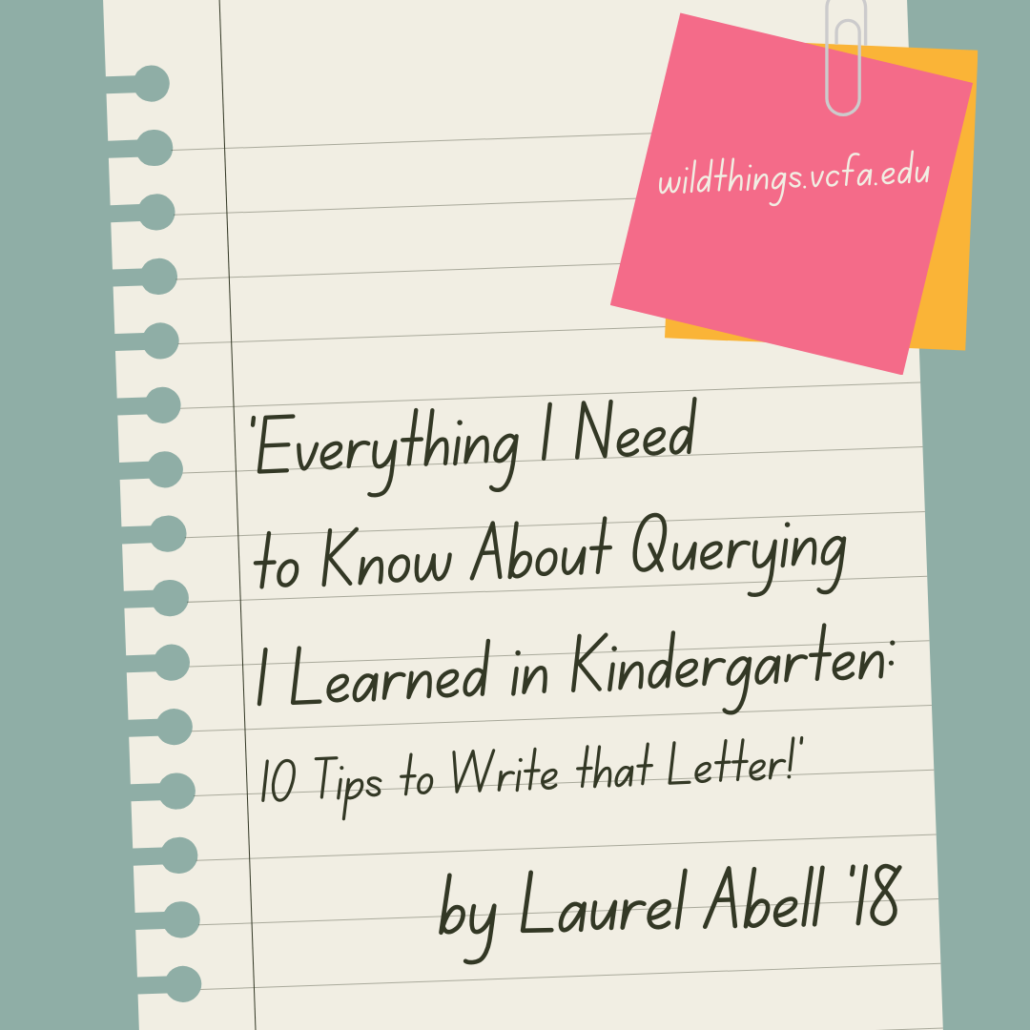‘Everything I Need to Know About Querying I Learned in Kindergarten: 10 Tips to Write that Letter’ by Laurel Abell ’18
1. Play nice.
The way to make a friend is to be one. When opening your query, introduce yourself and why you’re contacting them. If you know something personal about them or have a connection, mention that specifically (help them remember). Otherwise, keep it simple, short & sweet. Save your rambling old stories about how your kids or grands love your book for after it sells and you’re chatting about it on Oprah. Just be polite and kind and sincere. Nice people are also usually humble. So, let your work speak for itself.
2. Do your homework.
Just do it. Don’t wing it. Ever. You might think you’re coming off quirky & savvy, but (and this is from a teacher!) they can tell if you did your homework or not! As a matter of fact, it shows up early and clearly, and what it does for your reputation is that they learn quickly whether they can count on you or not. Be count-on-able. Do your research and make sure you’re querying an open agent who reps the genres you write. Cold querying doesn’t mean blind querying. Remember, you’re trying to begin a lasting relationship and this letter is part of its foundation.
3. Spelling counts.
Remember how it felt when a teacher or classmate forgot your name or got it wrong? Maybe you have one of those names, like mine, that people often get wrong. Names matter, and misspelling them makes people feel unseen and unimportant. You do not want the agent or editor you’re querying to feel those things! Getting their name right is your first chance at making a good first impression, so double check the spelling. Also, use their given name (not an assumed shortened version) and, to avoid title confusion, it’s both safe and professional to simply say: Dear First Name Last Name.
4. Follow the rules.
Didn’t you used to hate it when that one kid in school always tried to cheat or take short cuts!? Or what about those times they said they didn’t see, know, hear, or maybe remember the directions? [Insert eyeroll] There are rules that each agent has outlined (that are usually very public!) to direct you in how, where, and when to query. Do not break those rules. You are not an exception. Don’t give them any reason to keep your work in the slush pile.
5. Be yourself.
Don’t be (too) weird. Show who you are by writing in your unique voice, but it must be your voice. Do not write as your character or (I mean, this should go without saying, but I saw it on the internet so it must be true!) in the voice of your dog or kids! The newly coined word profersonal (or perfessional?) applies here. Be you. But in business casual clothes. Keep your bio to the facts that matter. This isn’t a CV or resumé. But in 2-4 sentences let them know what the blurb on the back of your newly published book might say about you.
6. Show and tell.
Bring something special. And after you grab your audience’s attention and have shown them who you are and what your story is about, tell them the necessary specs of the manuscript. Who’s your audience? What’s the word count? Where might this book find a home on the shelf? And don’t forget the TITLE! Yes, in all caps. I see so many nameless stories in queries or TwitterPitches. The title is your book’s first impression, so make it a good one, too.
7. Share with others.
Sharing is caring, as the saying goes. However, most of us don’t really like to do it all of the time, whether it’s cupcakes or manuscripts. But in the case of your query letter, always share with beta readers to get feedback. I’m amazed how many times I spot a repeat of the the word the. Or that missing TITLE. And perhaps someone else’s eyes can see how your pitch is too bland or just plain TMI. Get feedback and apply it. No, you’re not always right.
8. Expect rejection.
Not everybody is for everybody. Yes, we should all play nice (see #1), but it is important to find our people. If you get rejection, that person is probably not your person. Rejection is earned by people who try, by people who lay down all their excuses and reach for their goals anyway. Getting rejections means you’re working toward your goal. Not getting them means either you’re already succeeding & publishing regularly or you’re just sitting there staring into the void of what ifs and why nots. Go get your rejections! They pave the path to success.
9. Flush.
Personally, I keep (even print) all my rejection letters, because one day I will spell the word YES on my lawn with them and take a photo. Then, I’ll tape them all together into a scroll to share with kids how long and challenging a road it was. They are a badge of honor to me, proof that I’m still in the game. But the sear of pain that hits my gut when one arrives, that feeling that I’ll never be enough, that must be flushed! Sure, feel it. The blow will perhaps knock you back a step (or two or a dozen), but flush as soon as you can. And then, wash your hands (of it) and send another query! Rinse & repeat: Query-Rejection-Flush-Query. And that leads me to the final point…
10. Never. Give. Up.
Not on you. Not on your dreams. Not on anything that matters. Because the day you give up on your dreams is the day you give up on yourself. So, do not quit on you! Query on til the contract comes.








